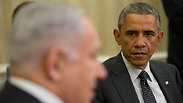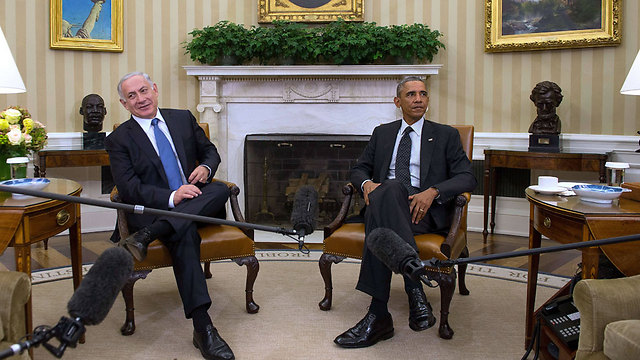
Obama-Netanyahu relations never promised happily-ever-after
Since they took office in early 2009, the two leaders have had a series of bumpy encounters, verbal clashes and even diplomatic skirmishes.
When President Barack Obama and Prime Minister Benjamin Netanyahu took office early in 2009, there were plenty of reasons to expect their relationship would be difficult.
The president and the prime minister have stark differences in personality, politics and world view. Still, few could have predicted the downward spiral of lecturing and name-calling.
Start with the differences between Obama and Netanyahu, add in disagreements over Iran's nuclear program, a Republican-led Congress trying to assert itself and the coming Knesset elections, and it becomes "the perfect storm" in the US-Israeli relationship, says the Wilson Center's Aaron Miller, who was a Mideast adviser and negotiator for Republican and Democratic administrations.

A look at how the dynamic between Obama and Netanyahu has played out over the years.
Wary start, March 2009
Netanyahu takes office just months after Obama, and a clash of ideas and chemistry is immediately evident. The prime minister aims to expand Israeli settlements in the West Bank and says a peace agreement with Palestinians is impossible in the current environment. Obama pledges to "aggressively" seek a Mideast peace deal and sends an envoy critical of Israeli settlement-building. Netanyahu also takes a hard line on ensuring that Iran, Israel's enemy, does not obtain nuclear weapons; Obama favors talking with Tehran.
Settlement strains, June 2009
During a visit to Cairo, Obama delivers a much-anticipated speech about US relations with the Muslim world in which he calls for the creation of an independent Palestinian state and says the US "does not accept the legitimacy of continued Israeli settlements."
Israel puts out a carefully worded response leaving out any reference to settlements or other issues where the two countries are at odds.
The lecture, May 2011
Obama suggests using Israel's 1967 boundaries as the basis for restarting stalled peace talks. Seated next to Obama in the Oval Office, with journalists listening in, Netanyahu delivers a long dissertation on why this won't happen, calling the idea "indefensible." But the president tries to minimize the rift, saying, "Obviously there are some differences between us in the precise formulations and language. That's going to happen between friends."
Confidences exposed, November 2011
During a meeting of world leaders in southern France, French President Nicolas Sarkozy is overheard telling Obama, "Netanyahu, I can't stand him. He's a liar." Far from disagreeing, Obama replies: "You are sick of him, but I have to work with him every day."
No time, September 2012
Obama turns down a request to meet with Netanyahu when the prime minister visits the US to attend the UN General Assembly. The White House cites a tight schedule for the president.
Making nice, March 2013
The re-elected Obama visits Israel for talks with Netanyahu aimed at laying the groundwork for a new Mideast peace push. Obama and Netanyahu together examine the ancient texts of the Dead Sea Scrolls as the president tries to erase perceptions that he sees the Holocaust, not historical ties to the region, as the rationale for Israel's existence. Obama becomes the first sitting US president to receive Israel's highest civilian honor when he is awarded the Medal of Distinction during a lavish dinner.
Chill in the air, March 2014
The mood is cooler when Netanyahu visits Obama in the Oval Office. With the peace process flagging, Obama tells Netanyahu that "tough decisions" are needed to move forward on talks with the Palestinians. "Israel has been doing its part," Netanyahu says, "And, I regret to say, the Palestinians have not."
Escalating tensions, October 2014
Netanyahu complains that recent White House criticism of Israeli settlement construction goes "against American values." The divide over how to counter Iran's nuclear program widens into a chasm. When an unidentified US official is quoted using barnyard terms to deride Netanyahu as cowardly and recalcitrant, the report reverberates across Israel. The State Department calls the anonymous remarks inappropriate, but there are growing concerns of a crisis in US-Israeli relations.
Going nuclear, January-March 2015
House Speaker John Boehner, a Republican, arranges -- without notifying the White House -- for Netanyahu to address a joint meeting of Congress in March to speak out against the potential nuclear deal. The White House complains of a breach of protocol and says Obama won't meet Netanyahu while he's in town.
Netanyahu, just weeks away from Israeli elections, says he'll come anyway. Obama's national security adviser, Susan Rice, in unusually harsh words, says Tuesday's planned speech has "injected a degree of partisanship, which is not only unfortunate. I think it's destructive of the fabric of the relationship."










